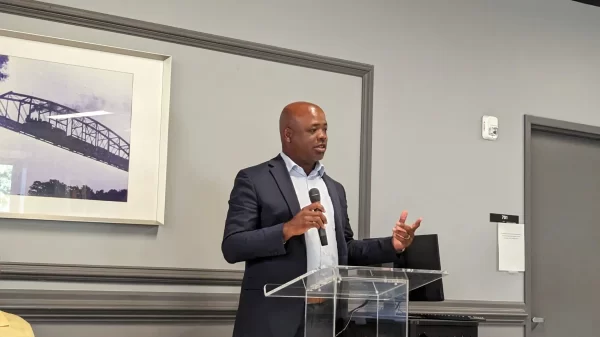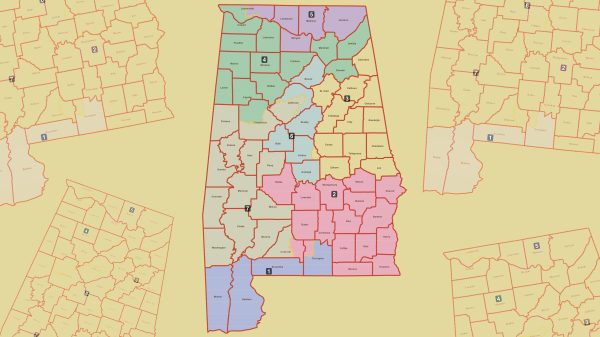The Alabama Senate passed legislation on Thursday to allow a school worker to administer life-saving medication to a child who is having a seizure at school. House Bill 76, the Seizure Safe Schools Act, is sponsored by state Rep. Thomas Jackson, D-Thomasville, and co-sponsored by Rep. David Wheeler, R-Vestavia. HB76 was carried in the Senate by Sen. Billy Beasley, D-Clayton.
“I commend state legislators for approving Seizure Safe Schools legislation,” said Sara Franklin, the executive director at Epilepsy Foundation Alabama. “Our organization looks forward to working with the State Department of Education and local boards of education to provide seizure training for school personnel and school nurses.”
Beasley explained that the bill allows medication to be given by volunteer medication assistants to save the life of a child who is having a seizure.
Sen. Rodger Smitherman, D-Birmingham, said: “We should have nurses in the schools. The money is there.”
Beasley said that “just 70 to 75 percent of our schools have nurses.”
“If we do this, we won’t ever get nurses,” Smitherman said. “It would cost $36 million to put nurses in every school.”
Beasley explained: “The Legislature has already authorized medication assistants to give insulin and Narcan in overdoses. This has a safe and easy applicator like with Narcan.”
Smitherman insisted that “the money is there to have nurses.” He wanted to dialogue with the Alabama superintendent of education. “We are spending money everywhere else,” he said.
Beasley said that “unlicensed medication assistants will receive training from the Alabama Epilepsy Foundation.”
Smitherman said: “If we pass a lottery, we are not going to have gaming in our lifetime; if we do this, then they are not going to hire school nurses.”
“The State Superintendent has a mad on for school nurses,” Smitherman said, demanding that state Superintendent Eric Mackey come to the Senate to address why there was not a request to fully fund school nurses in his education budget request. The FY 2022 education budget was the largest in state history, with dramatically increased funding for a number of state education priorities.
Beasley said there are rural systems with one school nurse and three or four campuses. “If a child is having a seizure there may be no way that she can get there in time to give that child medication,” he said. “All we are trying to do is to get medication to a child who is having a seizure.”
Smitherman told the Senate: “Don’t insult my intelligence by saying that we don’t have the money to do it (hire more school nurses).”
Sen. Bobby Singleton, D-Greensboro, proposed an amendment where if a school nurse is on duty, then the nurse would be the one to administer the treatment rather than the unlicensed medication assistant. That amendment was rejected by the Senate.
Singleton next proposed an amendment that shared a list of persons authorized to administer medications at the school to the parent of a child who has been diagnosed as needing medication. That list of unlicensed medication assistants would also be on the school’s website.
Sen. Tim Melson, R-Florence, a doctor, said: “During a seizure, oxygen is being depleted in the brain rapidly. The faster that aid can get there is essential.”
“I applaud you for bringing this bill,” Melson told Beasley.
Beasley said: “This is a controlled drug, so it is kept under lock and key.”
Sen. Dan Roberts, R-Mountain Brook, told Beasley: “We are totally for what you are trying to do.”
“These are emergency use situations where time is of the essence,” Beasley said.
Smitherman asked how much the medication costs. Beasley answered that the cost of the medicine is $700.
Beasley said: “Seizures are caused by not receiving the right nerve impulses or receiving too many impulses. The medication relaxes the nerve. The drug itself is Diazepam.”
The Diazepam is in an easy-to-use applicator and is already at the proper dosage.
Sens. Jim McClendon, R-Springville, who chairs the Senate Health Committee; Jabo Waggoner, R-Vestavia, who chairs the Senate Rules Committee; and Singleton supported Smitherman’s demands that the Alabama State Department of Education appropriate American Rescue Act dollars to address the school nurses shortage.
That a growing number of Alabama schools lack a school nurse and that the State Department of Education, which supports this legislation, appeared to be accepting of the institutionalization of that moving forward upset some in the Alabama Association of School Nurses. Kristine McClary is the legislative liaison with the AASN.
“While AASN supported the training of anyone in the education system on seizures how best to help a student, I think the misconception was that students were not receiving care at schools for seizures,” McClary said. “Today- if a student has a diastat order, a nurse is available during the day and on school-sponsored events. The delegation removed nurses from that equation and replaced them with an unlicensed non-medical person.”
“That fact wasn’t really spotlighted by the sponsors of this legislation,” McClary said. “The unexpected silver lining in this very contentious process- was that for several hours the Senate was able to hear about the need for school nurses in every school. That federal dollars were available and yet leaderships actions (or lack of) resulted in schools still without nurses, without running water in the nurse’s offices, without the very basic needs of a health office- in spite of hundreds of millions of dollars available to remedy the situation. We are so very grateful to Senators Smitherman, Singleton, McClendon and Waggoner for doing all that they can to make sure every school has a nurse – every day- available for every student.”
There was a late-night meeting with the Alabama State Department of Education in Waggoner’s office during which the ASDE assured senators that some of the American Rescue Act dollars that have been awarded to the schools to address the COVID-19 global pandemic would be allocated to funding school nurses so that a licensed LPN is on the staff of every public school.
Smitherman introduced an amendment to require that all schools hire a full-time licensed school nurse. That amendment was adopted and the bill was passed as amended 29 to 0.
The bill now goes back to the House for their consideration of the Senate changes. Thursday was day 29 of the 2021 Legislative Session.






















































